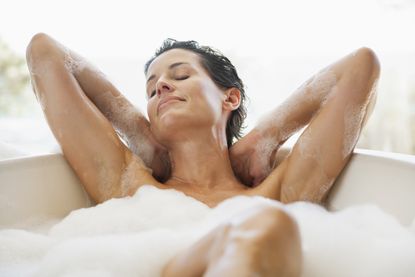How often do you need to shower or bathe? We ask the experts
Temperature, length, and skin type all play a factor in how often you should bathe

Celebrities made headlines this week for their bathing routines. Jake Gyllenhall, Kristin Bell, and Ashton Kutcher all said they don’t bathe every day, while Dwayne Johnson said he showers three times a day.
About two-thirds of Americans shower every day, while in China about half the population reports bathing twice a week. Meanwhile, 80% of Australians shower every day.
So, how often do you really need to shower? As we head back into social life and working in person, it’s more important to know than ever. Luckily for you, we asked the experts:
You might also like…
How often should you wash your hair? And will it eventually self-clean?
How often do you need to shower or bath?
The answer isn’t clear. It all depends on your skin type. Those with drier skin should shower less, while those with oily skin can get away with showering more often.
Dr Tanya Bleiker, President of the British Association of Dermatologists told woman&home, "Showering or taking a bath once a day removes dead skin cells and dirt and will stop you from smelling. How often to wash is a personal choice and your lifestyle and whether you have any skin conditions will dictate frequency."
Your activity level should also be taken into consideration. If you’re working out every day and sweating a lot, then you should shower more often than those who aren’t sweating regularly.
"If you are an active person that goes to the gym or runs often, for example, you may want to wash more frequently because you are going to be sweating more," said Dr Tanya. "Active people can be more prone to fungal infections, such as athlete's foot, so it is important to pay attention to the feet, washing regularly and drying between the toes properly along with regularly washing your socks. "
Sign up for the woman&home newsletter
Sign up to our free daily email for the latest royal and entertainment news, interesting opinion, expert advice on styling and beauty trends, and no-nonsense guides to the health and wellness questions you want answered.
Some experts say the issue is not actually how often you shower, but for how long. Hot water can dehydrate skin, and especially for people with dry skin long, hot showers can be damaging. Los Angeles-based dermatologist Ivy Lee recommends short showers of no more than 10 minutes. He told the Washington Post that it’s best to take a room-temperature shower, or even a cold shower, which is less drying to skin.
Jules Lipoff, an assistant professor of clinical dermatology at the University of Pennsylvania’s Perelman School of Medicine, agreed. While long showers can be relaxing, Lipoff said they are “certainly not medically or hygienically necessary.”
Dermatologist Shilpi Khetarpal, MD recommends showering once a day to rid the body of allergens, bacteria and viruses. But he says more than that is excessive, and also recommends short showers. “Some people shower in the morning, after the gym, then again before bed. That’s not necessary, and can be very drying and irritating for your skin,” he told the Cleveland Clinic.
Shower best practices
While experts don’t agree on an exact number of showers you should take per week, and much of the decision depends on your skin type and physical activity, they do agree on a few things.
Dr Tanya said, "Keep the water temperature warm, not hot, as hot showers can dry out the skin and irritate it."
The shower should be short and the water should be warm or cool, but not hot. “Normal, healthy skin maintains a layer of oil and a balance of “good” bacteria and other microorganisms. Washing and scrubbing removes these, especially if the water is hot,” writes Robert H. Shmerling, MD in Harvard Health Publishing.
His advice is especially relevant during a global pandemic. “Our immune systems need a certain amount of stimulation by normal microorganisms, dirt, and other environmental exposures in order to create protective antibodies and “immune memory,” he says.
“This is one reason why some pediatricians and dermatologists recommend against daily baths for kids. Frequent baths or showers throughout a lifetime may reduce the ability of the immune system to do its job.” He recommends showering several times a week for about four minutes.
Another thing many can identify with, regarding the pandemic, is how dry your hands get from frequent hand washing. Dr Tanya explained, "Frequent soap use can also cause irritation, something many people have become familiar with during the pandemic, as increased handwashing has led to an increase in irritation of the skin on the hands. For people with sensitive skin or eczema we advise using soap substitutes and non-fragranced products."
Scented soaps and other bath products can strip the skin of moisture, and should be avoided no matter how nice they smell. Experts said to reach for products labeled “for sensitive skin.”
Don’t scrub your whole body. Experts say you can wash your face, armpits, and groin with soap, but the rest of your body is fine with just water.
Your hair likely needs to be washed less often than your body. Skip the shampoo every other shower and your hair will be healthier.
Moisturize post-shower. Like with soap, a fragrance-free moisturizer is best.
If you follow those tips, healthy, clean skin is just a lukewarm, short, fragrance-free shower away.
How often should you bathe babies and children?
Mila Kunis and Ashton Kutcher recently opened up about not washing with soap every day and how they chose not to bathe their children daily either. While appearing on Dax Shepard's Armchair Expert podcast Mila said, "I also didn't wash them every day. I wasn't the parent that bathed my newborns—ever." Ashton added, "If you can see the dirt on 'em, clean 'em. Otherwise, there's no point."
Although this raised a heated debate, according to Dr Tanya, they might actually be onto something. "When it comes to bathing a baby or young child, who naturally have more sensitive skin, it is best to avoid over-washing as it can dry out their skin," she said. "Research has suggested that washing too frequently in the first year of life can increase the risk of developing skin conditions such as eczema."
Rebecca Holland is a travel and food writer based in Chicago. She has written for the Guardian, New York Times, Architectural Digest, Food & Wine, Wine Enthusiast and more. She is currently a graduate student at Northwestern's Medill School of Journalism. When not working, you can find her eating her way through Chicago's neighborhoods, or in non-pandemic times, traveling around the world.
-
 Zara Tindall's suede olive green trench coat is the perfect staple for April showers
Zara Tindall's suede olive green trench coat is the perfect staple for April showersZara Tindall stepped out in a classic suede trench coat for the April meeting at Cheltenham
By Jess Bacon Published
-
 Baby Reindeer: Did Richard Gadd really break down on stage and when did he write his show, Monkey See Monkey Do?
Baby Reindeer: Did Richard Gadd really break down on stage and when did he write his show, Monkey See Monkey Do?Donny broke down on stage in Baby Reindeer episode 6 and you might be wondering if this scene was true to creator Richard Gadd's life
By Emma Shacklock Published